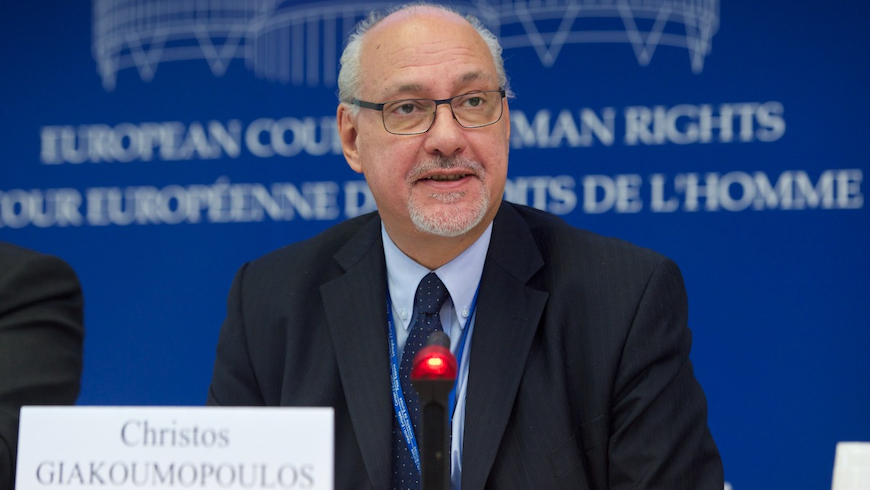Speech by Christos Giakoumopoulos
32nd Meeting of the FRA Management Board
12-13 December 2019, Vienna
Dear Chair,
Dear members of the Management Board,
Dear Director,
Dear FRA colleagues,
It is a great pleasure to address you today to speak about the cooperation between the Council of Europe and FRA. Many adjectives have been used so far to describe it. Strong. Complementary. Exemplary. I can only repeat these adjectives and add that our cooperation is deepening daily as we address the new challenges facing Europe, challenges to which we try to identify appropriate responses within our respective mandates. This is the case for example with artificial intelligence and human trafficking for the purpose of labour exploitation, both are priority areas for the Council of Europe, and I believe for FRA too.
2019 has been a year where the institutional cooperation has been particularly strong, with Rainer Hoffmann, the Council of Europe’s independent person addressing the Steering Committee for Human Rights (CDDH) on 20 June, and the Group of Rapporteurs on External Relations of the Committee of Ministers on 10 September. It was also the first time GREXT’s chair visited FRA last month. In October was also the first time when FRA’s senior management met for the first time with their counterparts in Strasbourg to discuss areas for increased cooperation. I was delighted to attend this highly productive and friendly meeting.
You have received the overview of the cooperation between the Council of Europe and FRA for 2019, so I will not repeat all of the many areas where we worked together. Let me just highlight few examples.
FRA surveys continue to be extremely useful to the Council of Europe’s monitoring mechanisms. For example, ECRI and FRA continue sharing and referencing each other’s’ data for relevant country reports. FRA systematically uses ECRI’s country findings in its national data workshops, and highlights ECRI’s recommendations. FRA’s Roma survey was extremely relevant to the work of the CoE’s ad hoc Committee of experts on Roma and Traveller Issues (CAHROM).
In many of our areas of action, reliable large-scale figures are something that the Council of Europe cannot produce, but very much needs, to assess the evolution and the impact of our action in the long run. For instance, this year we have celebrated 5 years from the entry into force of the Istanbul Convention: in this area the FRA survey, which dates back to almost 10 years already, still remains a reference source. Meanwhile other bodies have developed useful data and tools, like EIGE and Eurostat, and we welcome this growing interest, but for the Council of Europe, it is essential to see a new large-scale survey from FRA in this area, in order to be able to compare data and perhaps also to seek for other information that we may not have thought at the time and that the practice of implementation of the Istanbul Convention makes today appear as useful and necessary. Moreover, fresh data may also serve to demonstrate that violence against women and domestic violence are indeed a serious human rights problem in all EU member states and that where the Convention has been ratified and implemented, it has produced some change.
Let me also refer to FRA’s upcoming study on National Human Rights Institutions (NHRIs). The Council of Europe, with its bodies, notably the CDDH and the Human Rights Commissioner contribute to the study, and the CoE Contact Person for FRA sits on the Advisory Board. There is nothing unusual in this. But I would like to highlight that we look forward to the publication of FRA’s study in May next year because we expect that it will feed into the CCDH’s current work on the update of the CM Recommendation R(97)14 on the establishment of independent national institutions for the promotion and protection of human rights. In this context, let me also recall that after the adoption of the Venice Principles on Ombudsman institutions on 15 March, the Committee of Ministers adopted on 16 October Rec (2019)6 on the development of the Ombudsman Institution.
We are delighted with the recent launch of EFRIS. This “Human Rights Gateway” (a much nicer name than “one stop shop” which was used before!) brings together data and information from existing human rights databases, notably HUDOC in the Council of Europe. With Improved visibility and accessibility of the Council of Europe’s monitoring mechanisms and findings, it will certainly contribute to a better assessment of fundamental rights in the EU, and thus help policy-makers at the national and EU levels to undertake the right reforms and take the right decisions. We look forward to Jonas Grimhesen’s presentation to the Secretariat on 17 January, and more importantly, to the inclusion in EFRIS of all Council of Europe’s monitoring mechanisms in due course.
One interesting development for the Council of Europe, is the participation of non-EU member states in FRA’s activities and management board. Here again, we can both benefit from our respective tools. I was interested to hear that the French government has recently suggested that prospective EU Member states must, as a first step, be part of EFRIS. Let’s see how the tool develops and how it is used by its stakeholders!
Another area of joint work I want to highlight is FRA’s online criminal detention database, which was launched yesterday, and which contains national standards, laws and monitoring reports on detention conditions from across the EU. The objective of this compilation of information on prison conditions and monitoring across all EU member States is to assist judicial authorities when deciding on transferring detainees to another EU member State. This new tool has undeniably benefited from strong Council of Europe input and expertise.
In the area of forced returns of irregular migrants, the Council of Europe and FRA both try to mitigate the risk of serious human rights violations resulting from the absence of an external, independent and judicial control of Frontex activities. FRA is assisting Frontex in the training of the 40 internal fundamental rights monitors foreseen under the new Frontex Regulation. On its side, the Council of Europe supports the members states’ Ombudsman institutions and National preventive mechanisms against torture who offer independent, external monitoring of the human rights compliance of forced-return operations by Frontex, including as regards the publicity of findings and recommendations made, which unfortunately the new Frontex Regulation does not provide for. Ultimately, only the accession to the European Convention on Human Rights will secure the independent external judicial control that is required. Until this accession, there will continue to be a grey zone in terms of human rights protection in the EU. The resumption of accession negotiations between the EU and the Council of Europe is certainly good news but it is impossible at this stage to anticipate its outcome.
Finally, we have been supporting the consultation process on the possible establishment of a Framework of commitments for Human Rights cities, based on the experience of the very successful Intercultural Cities network. We look forward to discussing the modalities for cooperation in this respect.
I could give you many more examples of cooperation, but I prefer at this point to leave time for questions and discussion. Thank you very much for your attention.




